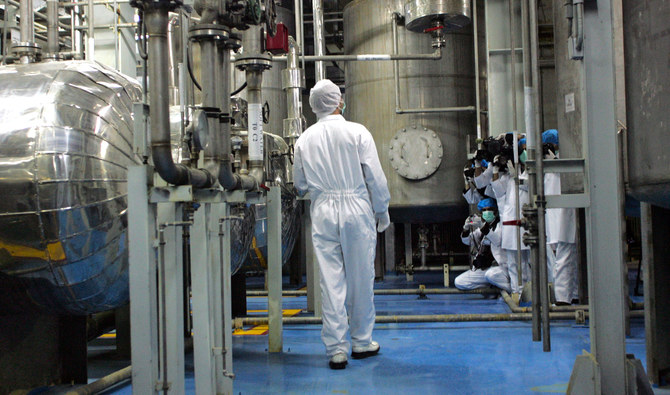CHICAGO: Leaders of the Organization of Iranian American Communities hosted an online conference on Friday to mark the 43rd Anniversary of the Iranian Revolution.
It included words of solidarity from more than 40 members of the US Congress, who condemned Iran as the world’s “worst sponsor of terror.” But there was criticism from some of President Joe Biden’s efforts to revive the Joint Comprehensive Plan of Action, also known as the Iran nuclear deal.
On Jan. 7, 1978, Iranians began to protest against the oppressive rule of Shah Mohammed Reza Pahlavi, eventually forcing him to flee to the US on Jan. 16, 1979. Ayatollah Khomeini, who had been exiled by the shah to France, returned to Iran soon after and took control of the country on Feb. 11, 1979. Since then, more than 120,000 Iranian protesters and dissidents have been murdered by the Mullah-led regime, according to resistance leaders.
Congressman Andy Barr, a Republican from Kentucky and member of the House Foreign Affairs Committee, reflected the sentiment of many of the speakers when he highlighted House Resolution 118. Signed last year by 251 members of Congress, it condemns Iran’s “state-sponsored terrorism” and calls for American support for efforts to establish a democratic, secular, non-nuclear Republic of Iran.
“I am honored to address you and renew our shared support for a free Iran,” Barr said during the conference. “Thank you for all of the pro-democracy activists working tirelessly on behalf of this cause.
“I am also taking action to prevent the United States from rejoining the Joint Comprehensive Plan of Action, otherwise known as the disastrous Iran nuclear deal.”
Barr introduced the Iran Nuclear Deal Advice and Consent Act of 2021, a law that prevents Federal funds from being used to rejoin what critics consider a flawed agreement, unless Congress ratifies the deal as a treaty. He said he and other representatives also introduced a law called the Maximum Pressure Act, which would reimpose Trump-era sanctions on the regime in Tehran.
“We know that tough sanctions work against Iran,” he said. “After the Trump administration implemented sanctions on the Iranian government, Iran’s foreign-currency reserves dropped 95 percent, the military budget dropped 25 percent and Iranian militia fighters had their pay cut in half.”
Greg Steube, a Republican from Florida and also a member of the House Foreign Affairs Committee, criticized Biden for adopting the “wrong approach to Iran.”
Congressman Don Bacon, a Republican from Nebraska and a member of the House Armed Services Committee, accused Iran of being in “constant violation of the UN Universal Declaration of Human Rights.”
He added: “It is my belief that it should be the policy of the United States to investigate and hold Iranian officials accountable for the extra-judicial killings of Iranian dissidents.”
Bacon noted that in recent years there have been hundreds of protests by citizens in Iran and the regime has responded to them with oppressive violence.
He said the US should investigate “the disgraceful actions of President (Ebrahim) Raisi and his involvement in the 1988 massacre (of political prisoners). He must be held accountable for crimes against humanity.”
Michigan Congresswoman Lisa McClain said: “This month marks the 43rd anniversary of Iran’s revolution, a revolution that began with the desire for religious freedom. Unfortunately, that revolution was usurped by a radical religious regime. I’m a proud cosponsor of House Resolution 118 and a proud supporter of the freedom of the Iranian people.”
Congresswoman Sheila Jackson Lee from Texas, a member of the House Homeland Security Committee, quoted equality campaigner Dr. Martin Luther King Jr. in demanding rights for people who promote democracy, freedom and human rights.
She said that King “had these words: ‘Why we can’t wait for democracy and justice.’ And he also had these words, and I remind you of them: ‘The Arc of the moral universe bends long but it bends towards justice.’”
She also noted that massacres took place in Iran in 1999, 2009, 2017 and 2019.
Maryam Rajavi, president-elect of the National Council of Resistance of Iran opened the meeting by reminding participants and viewers that the revolution began with the overthrow of the shah and his “violent tyranny.”
She added: “But since the shah had practically destroyed all democratic movements, he paved the way for the reactionary mullah to take over. This mullah (Ayatollah Khomeini) stole the revolution’s leadership by resorting to religious deception. As a result, religious fascism replaced the shah’s dictatorship.”
The NCRI has adopted a 10-point plan that includes the right of Iranians to vote, free elections, a market-based economy, a rejection of nuclear technology and development, respect for human rights, and a call for an investigation into Raisi’s role in the massacres of 1988 and the killings of protesters during subsequent protests.
Rajavi warned that any lifting of sanctions on Tehran would “only lead to more conflict, carnage, and insecurity in the region.”
The conference also featured videos of incidents in which dissidents destroyed monuments and banners in praise of Raisi and the ayatollahs. Rajavi said the continuing protests at all levels show that a revolution for freedom continues on the streets of Iran.














